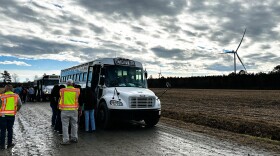This weekend put a strain on energy grids across the East Coast, downing power lines and testing power plants. The N.C. Department of Environmental Quality launched an energy rebate program in Mecklenburg and Wake counties that helps alleviate stress on the grid while saving people money on their monthly utility bills.
MORE STORIES
-
Duke plans to replace its existing coal power plants with nuclear reactors before 2040. These power plants take an average of 10 years to build. The utility submitted an early site permit application for potential new nuclear development in North Carolina.
-
President Trump has railed against renewable energy — especially wind turbines. But for one county in eastern North Carolina, they’re producing some real economic tailwinds.
-
Duke Energy has proposed steep rate hikes for residential customers, starting in 2027. Some customers see a discrepancy between the company’s profits, forecasted savings and these requested rate increases.
-
Customers urge Duke Energy to delay rate hikes as it combines Carolina businesses to save $1 billionState regulators hosted two public hearings on Duke Energy’s proposal to merge its two Carolina companies into one entity, Duke Energy Carolinas. Tuesday night, two members of the public weighed in on the combination.
-
When Hurricane Helene flooded the town of Black Mountain, community members were stranded. The resulting blackouts meant residents couldn’t call for help. But one group of volunteers is resurrecting an old technology to face a new generation of storms.
Wind Energy
Renewable Energy
Electric Vehicles
Solar Energy
Wood Pellets




























